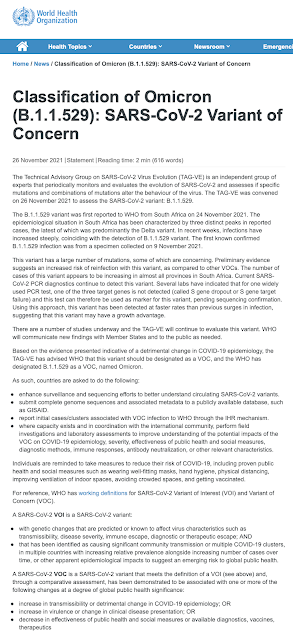With governments around the world reimplementing their lockdown plans for vaccinated and, in particular, unvaccinated individuals, a recent study entitled "Transmission potential of vaccinated and unvaccinated persons infected with the SARS-CoV-2 Delta variant within a federal prison" is proving to be very timely. Let's look at what this longitudinal study found.
First, here is a list of the authors of the study noting that the vast majority of the researchers work for the Centers for Disease Control and Prevention:
That said, the authors include this disclaimer:
"The findings and conclusions in this report are those of the author(s) and do not necessarily represent the official position of Centers for Disease Control and Prevention (CDC)."
Now there's a shock!
Let's start with some background information to put the study into perspective. In a recent outbreak which began on July 12, 2021 involving the Delta variant of the SARS-CoV-2 virus within a federal prison in Texas, the cumulative incidence of infection in two affected housing units was 74 percent with a rate of 93 percent among unvaccinated inmates and 70 percent among vaccinated individuals. Inmates were considered to be vaccinated if their primary vaccine series had been completed 14 or more days prior to the outbreak. Inmates were considered to be unvaccinated if they had not received any doses of a vaccine or had not completed all doses of a vaccine series. Among fully vaccinated inmates, 73 percent had received the Pfizer vaccine, 18 percent had received the Moderna vaccine and 9 percent had received the Janssen vaccine. In addition, 60 percent of the fully vaccinated inmates had received their full series of vaccines more than 120 days (range 81 to 140 days) before the outbreak.
Inmates were eligible to enrolled in the study if they had tested positive for SARS-CoV-2 between July 12, 2021 and August 4, 2021. The final study group consisted of 95 participants of which 78 or 82 percent were fully vaccinated and 17 or 18 percent were not fully vaccinated. These participants supplied the researchers with a total of 978 specimens for analysis between July 18, 2021 and August 9, 2021.
The purpose of the study was to examine the extent to which vaccinated persons who become infected with the SARS-CoV-2 virus contribute to transmission of the virus. To better understand this mechanism, the authors assessed markers of viral shedding in both vaccinated and unvaccinated consenting incarcerated persons with confirms SARS-CoV-2 infections. For ten consecutive days, the researchers took mid-turbinate nasal swabs from the subjects and used RT-PCR test, viral whole genome sequencing and viral cultures on these specimens.
Here are some of the highlights of the researchers' findings:
1.) the median duration of RT-PCR test positivity was the same at 13 days for both vaccinated and unvaccinated inmates.
2.) the median duration of RT-PCR test positivity was 10 days among Moderna vaccine recipients versus 13 days among both Pfizer and Janssen vaccine recipients.
3.) no statistical difference was detected in the median duration of viral culture positivity between inmates who were fully vaccinated and inmates that were unvaccinated with both groups having a median duration of 5 days.
The authors do note that there are several limitations to the study including the small number of inmates that were not fully vaccinated.
Here is the conclusion of the study with my bold:
"In this investigation, we found no statistically significant difference in transmission potential between vaccinated persons and persons who were not fully vaccinated. Therefore, our findings indicate that prevention and mitigation measures should be applied without regard to vaccination status for persons in high-risk settings or those with significant exposures. In congregate settings, and correctional and detention facilities in particular, post-exposure testing and quarantine remain essential tools to limit transmission when cases are identified, in addition to other recommended prevention measures.
Our data add to a growing body of evidence characterizing transmission potential from vaccinated persons. Future studies of transmission potential from vaccinated persons with infection, incorporating similar laboratory-based markers as well as evidence of transmission from secondary attack rates and network analysis, may help to further describe the contributions of vaccinated persons in chains of transmission as the pandemic evolves and new variants emerge."
All of this just in time for the Omicron variant as shown here:
This research is not particularly good news for the ending of government restrictions on our behaviour. Universal lockdowns here we come yet again.







No comments:
Post a Comment